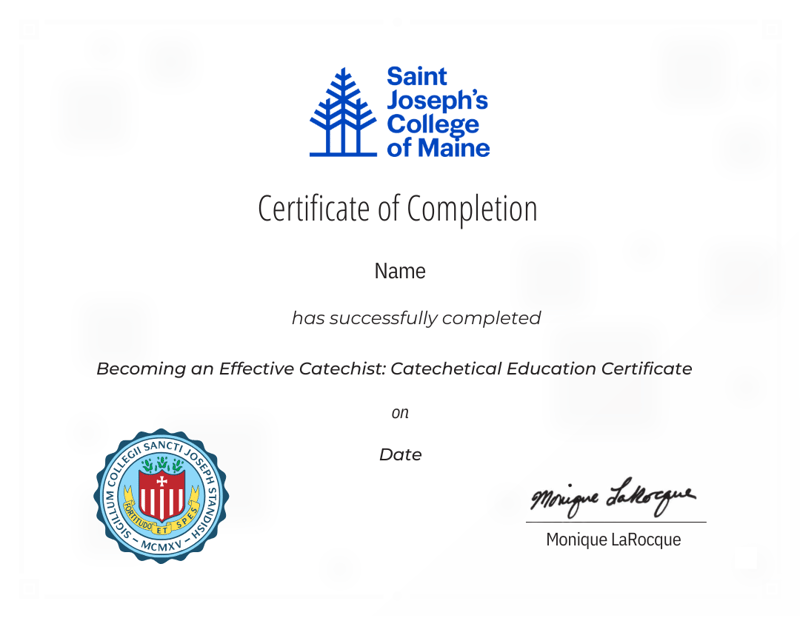Who is this Program for?
Make a difference in the lives of young children with a credential in Early Childhood Education from Saint Joseph’s College of Maine.
This program is designed to prepare aspiring and current early childhood professionals with mastery knowledge in the growth and development of the young child within a Catholic education framework. Topics include foundations in early childhood development, moral education for developing minds, cognitive and physical development of the young child, language acquisition, curriculum development, lesson planning, classroom management, health and safety guidelines, and family/community relationship building.

Representative Job Titles
-
Early Childhood Teacher
-
Early Childhood Teacher Aid
-
Daycare Teacher
-
Daycare Administrator
-
Daycare Programs Coordinator
-
Preschool Teacher
-
Preschool Administrator
Why Choose a Career in Early Childhood Education?
The Importance of Early Childhood Education
Course Overview
This program helps students to master knowledge regarding the growth and development of young children within the Catholic framework. The topics include the cognitive and physical development of young children, language acquisition, curriculum development, health and safety guidelines, and family/community relationship building.
Module 1: Early Childhood Theory and Foundations. This module includes historical and philosophical foundations, current practices, ethics, models of teaching, and application in early childhood settings. Students will examine the application of educational philosophies and theories in the early childhood classroom and evaluate their contemporary usefulness in maximizing learning outcomes for young children. Students will also examine the roles and expectations of early childhood educators and have the opportunity to reflect on and plan for their own professional development.
Module 2: Childhood Development and Moral Education. In this module students will identify and explain the stages of early childhood development and how morality is developed. Students will analyze how children's experiences at home, the environment around them, and their physical, cognitive, emotional, and social skills influence their developing sense of right vs. wrong.
Module 3: Early Childhood Catholic Classroom- Management and Environment. Students will learn strategies to manage the Catholic early childhood environment and what Catholic identity in the classroom looks like by using Catholic artifacts that represent the faith through a child's eyes.
Module 4: Building Collaborative Relationships. Keeping in mind that parents are a child’s first educators, students will learn strategies to collaborate with all shareholders including parents, instructional personnel, and the community.
Module 5: Early Childhood Assessment and Intervention. Using formal and informal assessment tools students will learn to identify potential concerns in the classroom. Students will learn to adapt and modify curriculum to meet the needs of all learners.
Module 6: Language and Early Literacy Development. Students will examine current research in language and literacy development, with an emphasis on effective instructional strategies for developing oral language and pre-literacy skills (such as phonemic awareness and decoding) in young children. Students will also learn about the tools used to assess language development skills.
Module 7: Instructional Planning for Early Childhood. In this module students will learn instructional methodologies for teaching children with and without exceptionalities, emphasizing instruction in language arts, social studies, and math. Students consider the developmental continuum of literacy instruction based on student data and individual needs.
Module 8: Faith Community and Cultural Awareness in Early Childhood. Students will examine cultural learning theories as well as the relationships and structures of family that make up the classroom and community. Emphasis is placed on identifying community, school, familial needs, and maintaining open communication with families in order to enhance the learning environment.
Subject Matter Expert
Still Have Questions?
This is a eight-week program that will require about 5 to 6 hours of dedicated time per week.
No. Micro-credentials are not transferrable for credit. These are skills-based training programs that differ from a traditional college course.
No, there are no assignment deadlines. There is, however, a prescribed pace for timely completion as learners will have a set number of weeks to complete the credential.
Micro-credentials are self-paced and do not require the learner to attend class at a certain time each week. Learners should expect to spend 5-6 hours per week engaging with the course at their own pace. Select weeks will have optional webinars featuring industry experts.
Students will receive a certificate of completion.

Please feel free to use any of these options to reach out to us. We would love to hear from you!
- Call us at: 508-925-4762
- Email us at: SJCadmissions@focusedusolutions.com
- Fill out the form at the bottom of this page
- Use the chat to connect with one of our counselors
Want to learn more?
.png?width=200&height=102&name=SJC_Logo_Stack_rev%20(1).png)